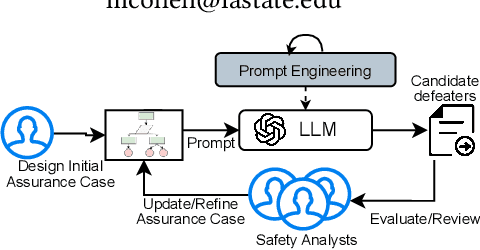Myra B. Cohen
CoDefeater: Using LLMs To Find Defeaters in Assurance Cases
Jul 18, 2024



Abstract:Constructing assurance cases is a widely used, and sometimes required, process toward demonstrating that safety-critical systems will operate safely in their planned environment. To mitigate the risk of errors and missing edge cases, the concept of defeaters - arguments or evidence that challenge claims in an assurance case - has been introduced. Defeaters can provide timely detection of weaknesses in the arguments, prompting further investigation and timely mitigations. However, capturing defeaters relies on expert judgment, experience, and creativity and must be done iteratively due to evolving requirements and regulations. This paper proposes CoDefeater, an automated process to leverage large language models (LLMs) for finding defeaters. Initial results on two systems show that LLMs can efficiently find known and unforeseen feasible defeaters to support safety analysts in enhancing the completeness and confidence of assurance cases.
Towards Engineering Fair and Equitable Software Systems for Managing Low-Altitude Airspace Authorizations
Feb 03, 2024



Abstract:Small Unmanned Aircraft Systems (sUAS) have gained widespread adoption across a diverse range of applications. This has introduced operational complexities within shared airspaces and an increase in reported incidents, raising safety concerns. In response, the U.S. Federal Aviation Administration (FAA) is developing a UAS Traffic Management (UTM) system to control access to airspace based on an sUAS's predicted ability to safely complete its mission. However, a fully automated system capable of swiftly approving or denying flight requests can be prone to bias and must consider safety, transparency, and fairness to diverse stakeholders. In this paper, we present an initial study that explores stakeholders' perspectives on factors that should be considered in an automated system. Results indicate flight characteristics and environmental conditions were perceived as most important but pilot and drone capabilities should also be considered. Further, several respondents indicated an aversion to any AI-supported automation, highlighting the need for full transparency in automated decision-making. Results provide a societal perspective on the challenges of automating UTM flight authorization decisions and help frame the ongoing design of a solution acceptable to the broader sUAS community.
Genetic Improvement @ ICSE 2020
Jul 31, 2020

Abstract:Following Prof. Mark Harman of Facebook's keynote and formal presentations (which are recorded in the proceedings) there was a wide ranging discussion at the eighth international Genetic Improvement workshop, GI-2020 @ ICSE (held as part of the 42nd ACM/IEEE International Conference on Software Engineering on Friday 3rd July 2020). Topics included industry take up, human factors, explainabiloity (explainability, justifyability, exploitability) and GI benchmarks. We also contrast various recent online approaches (e.g. SBST 2020) to holding virtual computer science conferences and workshops via the WWW on the Internet without face-2-face interaction. Finally we speculate on how the Coronavirus Covid-19 Pandemic will affect research next year and into the future.
 Add to Chrome
Add to Chrome Add to Firefox
Add to Firefox Add to Edge
Add to Edge